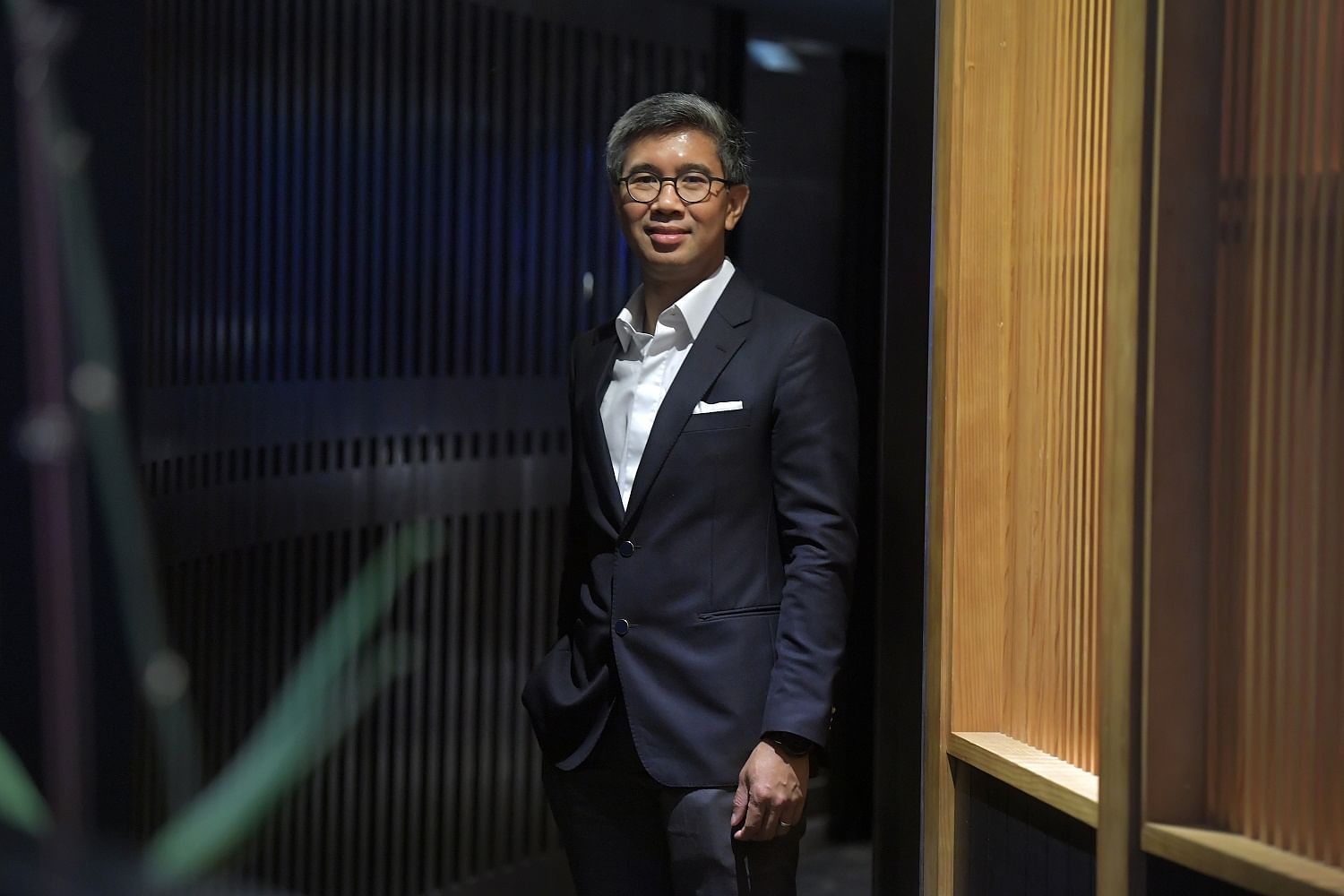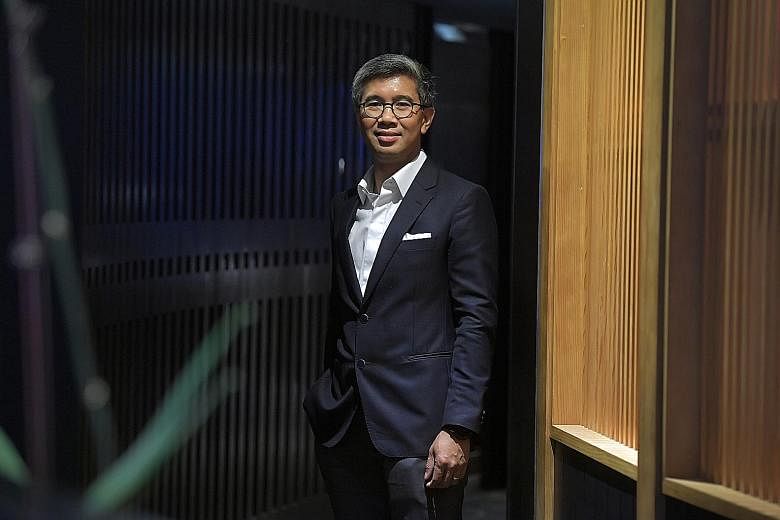Tengku Datuk Seri Zafrul Aziz knows something about trimming the flab. Once a man who tipped the scales at 82kg, he is now a trim 70kg. That zeal for fitness has been introduced to the executive office of CIMB Group, Malaysia's No. 2 banking services company, where he is the chief executive officer of both the bank and the wider group.
In late May, when CIMB announced results for the first quarter of 2017, Asia's banking industry and those who put money in it sat up and took notice. CIMB posted a record net profit of RM1.18 billion (S$380 million) and a resounding 10.3 per cent annualised return on equity (ROE), a lot of it thanks to improved efficiency.
The ROE's climb into the teens is the equivalent of breaking the sound barrier in the banking trade, where the common gripe these days is of tough compliance standards and capital adequacy ratios crimping the ability to lend and, therefore, profit. For an investment bank that still hasn't fully completed its evolution into a full commercial bank, the performance was nothing short of remarkable.
Behind the surge is 44-year-old Mr Zafrul, the wisecracking son of a Malaysian businessman and his civil servant wife, who led his first company at age 27.
Talent-spotted by CIMB chairman Nazir Razak, the Malaysian prime minister's younger brother, as he planned to vacate the CEO's corner suite to take the chairmanship, Mr Zafrul has proved a worthy pick.
Costs are being trimmed relentlessly, cross-selling made easier by effective data mining is yielding fresh business streams, and the group is on its way to building a digital bank that looks well-positioned to ride the Asean wave.
Over dinner in a Collyer Quay restaurant in Singapore recently, Mr Zafrul filled me in on his CIMB journey.

As chief executive officer of Maybank Investment Bank, he had been a happy camper at Malaysia's flagship lender when its group president and CEO Wahid Omar unexpectedly left in 2013 to join the government as a minister. While waiting for a replacement to be appointed, amid worry that Maybank without Mr Wahid would lose the plot, Mr Zafrul got a call from Datuk Seri Nazir inviting him to CIMB.
"I blame my leaving Maybank on Wahid," jokes Mr Zafrul, who'd flown in that morning from Beijing, after clinching a deal that would see China Galaxy Securities take a 50 per cent stake in the holding company of CIMB's stockbroking business outside Malaysia. "In life, you need mentors who can help and guide you. Frankly, I did not know Nazir's plans for me at the time."
Those were big shoes to fill. Mr Nazir, a fellow University of Bristol alumnus, had been group CEO for 15 years, powering CIMB from a boutique investment bank to Malaysia's second-largest financial services group.
Mr Zafrul's promotions came rapidly. Hired as CEO of the investment bank in January 2014, he was elevated to group CEO the following year. In January last year, he was also appointed CEO of CIMB Bank, the group's largest operating entity.
-
Fast facts
THE CEO
Tengku Zafrul Aziz, 44, is the group chief executive of CIMB Group.
He was schooled at Malay College, and graduated in economics and accounting from Bristol University. He holds a master's degree in finance and management from the University of Exeter. Career: Finance executive in AmInvestment Bank; investment analyst, then director, at Credit Agricole. Later, adviser to the president of Tenaga Nasional Berhad.
Mr Zafrul then went on to become the head of investment banking for Citigroup Malaysia. Subsequently, he was the CEO and substantial shareholder of Tune Money. Following that, he was appointed group director of Kenanga Holdings and director of Kenanga Investment Bank.
Prior to assuming his most recent role with CIMB, Mr Zafrul was CEO of Maybank Investment Bank.
He also heads the Kuala Lumpur Business Club and is on the boards of the Malaysian Investment Development Authority and 1Malaysia People's Housing Programme.
He is married to Raja Datin Johanna Arshad and they have four children aged between one and 13.
THE COMPANY
CIMB Group is Malaysia's second largest financial services provider. Headquartered in Kuala Lumpur, the group is now present in all Asean nations except the Philippines, and has market presence in China, Hong Kong, India, Sri Lanka, South Korea, the United States and Britain.
With 900 branches, CIMB Group has one of the most extensive retail branch networks in Asean. Its investment banking arm is also one of the largest Asia Pacific-based investment banks.
CIMB Group operates through three main entities - CIMB Bank, CIMB Investment Bank and CIMB Islamic.
CIMB Group is also the 92.5 per cent shareholder of Bank CIMB Niaga in Indonesia, and 93.7 per cent shareholder of CIMB Thai in Thailand.
The group is listed on Bursa Malaysia. It has 39,000 employees located in 15 countries.
Mr Nazir's advice as Mr Zafrul's career progressed: "Do not try to fill my shoes. Build your own shoes, and be your own man."
It's advice that he seems to have taken to heart.
CIMB Bank had announced a three-way merger with RHB Bank and Malaysia Building Society when he arrived. But there were issues about valuation, in addition to worries about executing the proposed merger. The broader economy was also slowing. Six months after revealing the merger plans, CIMB walked away from the deal. "That's when I announced our T-18 plan to transform the bank," says Mr Zafrul. "We had to make some very difficult decisions."
Announced in February 2015, T-18, which stands for Target 2018, focused on improving consumer satisfaction, trimming costs, and strengthening the organisational culture.
Specific financial targets to be attained by the end of financial year 2018 included an ROE of more than 15 per cent, a cost-to-income ratio of less than 50 per cent, and for consumer banking to account for about 60 per cent of group income, an increase of more than 10 percentage points. At the time T-18 was announced, the cost-to- income ratio was 59 per cent. It is now about 53 per cent, he says.
Driving costs down was not easy. CIMB, as it grew, had allowed expenses to bloat. Its move some years ago to buy the investment banking business of Royal Bank of Scotland outside South-east Asia had saddled it with operations in Australia, South Korea, Taiwan and Sri Lanka.
Now, it was consolidation time and the changes he ordered included exiting countries such as Australia as CIMB relooked investment banking. Then came the decision to shed the microfinance portfolio in Indonesia, and consumer finance in Thailand, where branch numbers were slashed from 120 to 70 as CIMB turned to focus on affluent Thais.
"There were no sacred cows. We looked at the business at (the) country, product (levels) and by division," he says. "It was a challenging time because of the slowdown. As for staff, I tried to keep the good ones and promote from within but others were brought in."
Three years ago, CIMB Group had 45,000 people on its roll. It currently has 39,000 and the number will be trimmed further as it focuses on technology.
The operating model was also revamped. CIMB, which operated in 17 countries, had a system where the country CEO reported to the group head but the people under him, such as the chief financial officer or head of the corporate bank, reported only to the country head. That was shuffled into a regional operating model.
Some country heads resented it but the move helped breed centres of excellence and economies of scale - what sense did it make, for instance, if each country had its own IT systems and procurement policies?
Mr Zafrul credits these changes for helping to lower the cost-to-income ratio.
Investors have taken note of the transformation. CIMB's market capitalisation is currently nudging RM60 billion after the share price climbed more than 60 per cent over the past year.
I ask him if his youth was a problem as he went about dismantling the old edifice. "I don't think so," he says. "But the staff wanted to see if I had a plan they could buy into. My thing was to make sure they were part of the plan. I am used to managing older people."
What's next for CIMB? It appears from the things he talks about that Mr Zafrul is keeping a keen eye on Singapore's DBS Group, run by his former boss at Citibank Malaysia, Mr Piyush Gupta.
He talks about wanting to put CIMB in on the flow of business - transaction banking, trade finance, cash management - areas in which DBS excels. He has also hired DBS Group head of digital banking Olivier Crespin to be CIMB's chief fintech officer. Tasked to explore innovative banking solutions such as automated loan processing, the Frenchman adds to the diversity of an executive committee that includes Indonesians, Americans, Singaporeans and Germans.
"Piyush put Olivier on a three-month gardening notice," Mr Zafrul chuckles. "If I were him, I would have done the same!"
CIMB will continue to build its wholesale business in Singapore, the city being the hub for many trans-Asean deals aside from generating its own business. Private banking on the island is booming too, and the bank recently recruited 12 people from ANZ Bank to handle the growth. Wealth managers have instructions to work closely with the wholesale business and the section that services small and medium-sized enterprises.
"We are very strong in the corporate sector," he says. "Now, I want them to talk to the business owners to start using our private banking services. When you do a merger or a share sale, you always deal with CEOs. In Indonesia, that tends to be the owner himself. So, we partner them, take them to market - and bring along our private banking folk as well."
In CIMB's home market, the deal pipeline is picking up, and so is loan growth. There is more capital-raising activity than in 2016, as well as opportunity to mediate some of the capital flooding in from China. Another territory seeing buoyancy is Indonesia, where CIMB Niaga is the largest foreign bank, with over 600 branches across the archipelago. CIMB has also secured an operating licence in Vietnam and expects to be allowed into the Philippines this year. For now, its gaze is firmly fixed on Asean.
Married to a naturopath and with four children aged between one and 13, Mr Zafrul says his current spare-time addiction is running. Last year, he ran the Tokyo Marathon and a few months ago, the Boston Marathon. He runs between 30km and 40km a week, and cycles over 100km. He can also do a yoga headstand without assistance. The ancient Indian practice helps him reduce sports injuries.
What does he see himself doing in five years? "I will probably still be here," he says. "Although I have told the board that ideally, no CEO should be given more than two terms of three to four years each. Otherwise, you get stale."
But he rules out a political career, saying he does not have the requisite skills for that profession. Then comes the wisecrack.
"It is too rough for me. At least in Singapore, politics is easier!"


